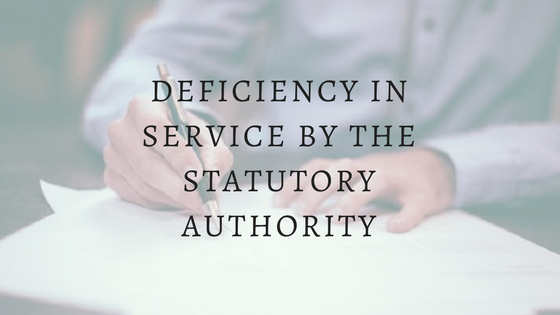Aapka Consultant Judgment Series- In this series, we are providing case analysis of Landmark Judgments of Hon’ble Supreme Court of India.
Lucknow Development Authority v. M.K. Gupta
AIR 1994 SC 787
JUDGES: R.M. Sahai and Kuldip Singh
Date of Decision: 05-11-1993
FACTS:-
The Lucknow Development Authority, a statutory authority fails to perform its duties satisfactorily with regard to construction of houses. One aggrieved consumer filed a case against the Lucknow Development Authority. The question of law in this case for consideration arose against the orders passed by the National Commission by which it ordered against the inclusion of statutory authorities under Consumer Protection Act.
ISSUE:-
- Could the authorities constituted under the Consumer Protection Act entertain a complaint by a consumer for any defect or deficiency in relation to construction activity against a private builder or statutory authority?
- Whether housing construction or building activity carried on by a private or statutory body is service within meaning of Clause (o) of Section2 of the Act?
JUDGMENT:-
The Hon’ble Court noted that the word ‘consumer’ is a comprehensive expression. It extends from a person who buys any commodity to consume either as eatable or otherwise from a shop, business house, corporation, store, fair price shop, etc. to the usage of private or public services. The definition of consumer deals in two parts. The first deals with goods and the other with services. Both parts first declare the meaning of goods and services by use of wide expressions. Their ambit is further enlarged by the use of inclusive clause.
Can a complaint be filed under the Act against the statutory authority or a builder or contractor for any deficiency in respect of a given property? The answer to all this shall depend upon the understanding of the word ‘service’. The term has variety of meanings. It may mean any benefit or any act resulting in promoting interest or happiness. It may be contractual, professional, public, domestic, legal, statutory etc. The concept of service is therefore very wide. How it should be understood and what it means depend in the context in which it has been used in an enactment. The definition of ‘Service’ under the Act is in three parts. The main part is followed by inclusive clause and ends by exclusionary clause. The main clause itself is very wide. It applies to any service made available to potential users. The words ‘any’ and ‘potential’ are significant. Both are of wide amplitude. The test is not if a person against whom complaint is made is a statutory body but whether the nature of the duty and function performed by it is service or even facility. A government or semi-government body or a local authority is as much amenable to the Act as any other private body rendering similar service.
The entire purpose of widening the definition is to include in it not only day to day buying of goods by a common man but also to such activities which are otherwise not commercial but professional or service oriented in nature. The provisions in the Acts, namely, Lucknow Development Act, Delhi Development Act or Bangalore Development Act clearly provide for preparing plan, development of land, and framing of scheme etc. Therefore, if such authority undertakes to construct building or allot houses or building sites to citizens of the State either as amenity or as benefit then it amounts to rendering of service and will be covered in the expression ‘service made available to the potential users’.
A person who applies for allotment of a building site or for a flat constructed by the development authority or enters into an agreement with a builder or a contractor is a potential user and nature of transaction is covered in the expression ‘service of any description’. It further indicates that the definition is not exhaustive. The inclusive clause succeeded in widening its scope but not exhausting the services which could be covered in earlier part. So any service except when it is free of charge or under a constraint of personal service is included in it. Since housing activity is a service, it was covered in the clause as it stood before 1993.
HELD:-
Court held that Statutory Authorities such as Lucknow Development Authority is liable for any deficiency in the services rendered by such statutory authority, and will be amenable to the provisions of the Consumer Protection Act, 1986.
To Get Legal Opinion from Advocates/ Legal Experts, Please click here
To Get Legal Opinion from Retired Hon’ble Judges, Please click here












